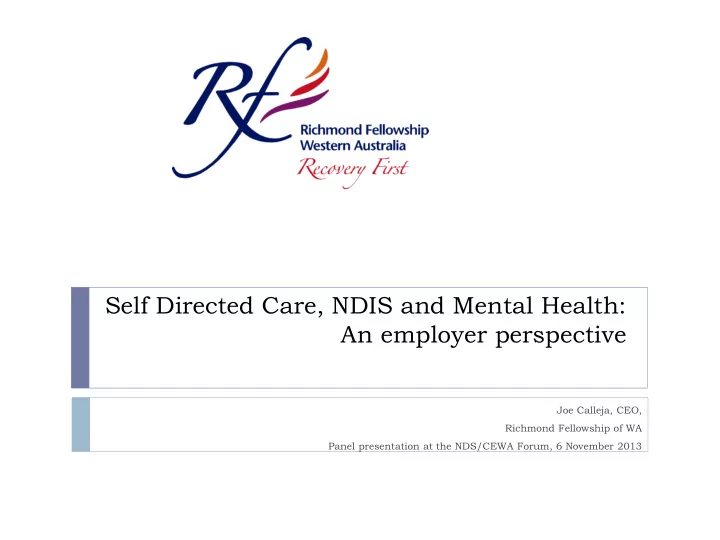

Self Directed Care, NDIS and Mental Health: An employer perspective Joe Calleja, CEO, Richmond Fellowship of WA Panel presentation at the NDS/CEWA Forum, 6 November 2013
OVERVIEW A Mental Health Employer Perspective on Self Directed Care Context for Self Directed Care and Mental Health in Australia NDIS and Mental Health: benefits and Challenges Some solutions to the challenges Mental Health Employer response to Self Directed care implementation
Context International and Australian Context US President’s New Freedom Commission on Mental Health 2003 UK Personalisation strategy – 2009 NHS self direction pilots Australian Aged care policy WA Economic Audit Report 2009
NDIS and Mental Health The Act refers to psycho social issues but its parameters do not allow the effective application of those issues. does not reflect a recognition of the episodic nature of mental distress. is based on a narrow definition of disability which requires long term or permanent disability as the basis of eligibility. assumes predictability in the content of all personal plans. The way the Act is structured and how the Pilots are unfolding is a potential policy and service disaster for people with serious mental health problems.
Challenges in common with the Disability sector Across both the Disability and mental health sector there are still many problems in common that are yet to be solved, such as the approach to pricing. The My Way pilot in WA holds some hope for solutions, including for the mental health component
Some possible solutions For Mental Health Modify the Mental Health pilot guidelines in the NDIS sites Quarantine Mental Health program Commonwealth funds until more clarity emerges from the pilot sites See what emerges from My Way pilot sites
RFWA Employer Response Advocacy Organisational culture Systems change Modify approaches to Self Direction Develop new products
Organizational Culture Education on the model Explaining links between what we already do and Self Directed Care Consumer and Family consultation Training in Person Centered Planning from a recovery perspective Re-engineering services where appropriate
Systems Financial – including accommodating pooling as well as individual budgets Administrative and reporting – Care Link plus system HR – zero hour contracts, Quality/Service improvement - supervision and training implications
Developing New Products Training on Recovery Working with Voices Partnerships with other agencies to develop combined service responses Thank you.
Recommend
More recommend